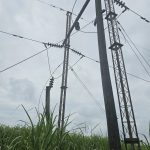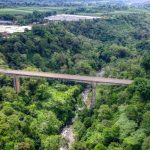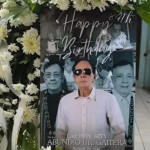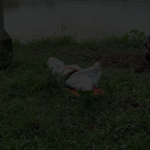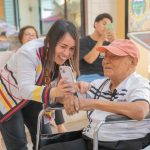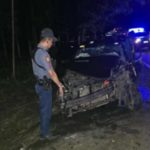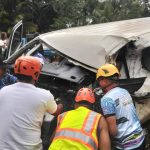In his inspiring commencement address, Junmerth Cretecio Jorta, a Metrobank Outstanding Filipino awardee urges BukSU graduates to be bridges between tradition and transformation—leading with empathy, innovation, and faith to uplift communities and shape a more inclusive future through smart education.
To our university president, Dr. Joy M. Mirasol; members of the Board and Regents, Vice President for Academic Affairs Dr. Hazel Jean M. Abejuela; Vice President for Research Extension and Innovation Dr. Carina Joanne V. Barroso; Vice President for Culture, Arts, Sports and Student Services, Dr. Lincoln V. Tan; Vice President for Administration and Finance, Mr. Dante S. Victoria Jr.; Dean of the College of Education, Dr. Ann Sheila C. Del Rosario; Dean of the College of Technologies, Dr. Marilou Espina; program chairpersons; unit directors; civil service representatives; faculty; proud parents; and guests, and most importantly, the Class of 2025: Good morning and congratulations!
Today, you stand at the threshold of a new chapter in your life. You’ve crossed a milestone that required persistence, sacrifice, and God’s grace. You have earned the right to celebrate—but more than that, you have been prepared to lead. I am deeply honored to stand before you today, not just as a speaker, but as someone who walked the same rugged path you may have taken—literally and figuratively. I, too, was once a student from a quiet place in Bukidnon with little to my name but a dream in my heart, a pen in my hand, and faith in God. And if there’s one thing I want to tell you today, it’s this: You don’t need to come from a place of privilege to make a powerful difference. You only need to be willing, faithful, and ready to walk the path—even when it’s steep.
Let me share with you five key lessons—shaped by my journey as a teacher, as a servant of God, and as a 2022 Metrobank Outstanding Filipino awardee—that align with today’s timely theme: Leading Innovative Pathways through Smart Education.
1. Innovation comes from a sense of mission – not just access to technology.
We often associate innovation with technology—gadgets, apps, automation. But let me challenge that idea. Innovation is not about having the best tools. It’s about finding creative, context-appropriate solutions to meet people’s needs—especially when resources are limited. When the pandemic struck and schools closed, many students in far-flung communities were left behind. My students in the highlands had no internet. No smartphones. Some didn’t even have electricity.
Instead of surrendering to the circumstances, I asked: “What do I have in my hands?” I used recorded voice lessons in Binukid, the local dialect. I walked on muddy trails and crisscrossing rivers. I personally delivered printed modules—even on foot, if necessary. And I mentored students under trees or bamboo huts when homes had no space to study. That’s smart education, not because it was digital, but because it was intentional, inclusive, and compassionate.
Class of 2025: Never forget that real innovation begins with love—with the courage to see problems not as roadblocks, but as opportunities to serve.
2. Smart education must be rooted in empathy and equity.
No matter how advanced our tools become, if we leave people behind, then we fail the true purpose of education. Technology should be a bridge, not a barrier. Smart education must adapt to the learner, not force the learner to adapt to systems that ignore their realities. In my years as a teacher in the last mile school in Bukidnon, I saw the faces behind the data: children who walked kilometers barefoot just to attend class, learners who goes to school starving, parents who barely knew how to read but wanted a better future for their kids, indigenous learners who felt unseen in mainstream curricula.
So, I asked myself: “How can I teach in a way that makes them feel seen, heard, and valued?” That question became my compass. Year 2015, I was asked by my school principal to supervise our extension school which was formerly run by the One Thousand Missionary and the SULADS (Socio-Economic Uplift Literacy Anthropological Development Services). Without hesitation, I accepted the challenge. I visited the school once a week every Thursday to help the teachers managed their students and to supervise the learning needs of the IPs. My visit to the school was exciting yet risky. I remembered walking in a muddy road and difficult terrain, crisscrossing 17 river systems alone for not less than two hours just to be in school. With the additional work assigned to me, I never felt the burden of going back and forth, to and from the Sitio School. On the contrary, I felt the joy of serving the indigenous learners.
A year later, our new principal asked me to stay in the sitio school for the entire school year. The assignment scared me, so I had to weigh all the possibilities and consider what may happen to me if I decide to accept it. Eventually, I bravely took it as an opportunity to help educate the indigenous community, a realization of becoming a missionary teacher. Handling an IP school was not easy. I was discouraged and alienated. There was miscommunication because of language barrier. I was homesick during my first week in the last mile school. I got sick after holding a class from Kindergarten to Grade 6 alone. I didn’t want to regret my decision to teach in such a remote location, but the pressure, commitments, and responsibilities had sapped all of my power.
Honestly, after a few months stay in the last mile school, I wanted to go back to Kalagangan Central School where I only teach a single grade with 45 learners. I started losing interest in becoming a missionary teacher. I sought advice from other people about the crucial decision I needed to make. I asked myself if can I still manage to stay there longer without electricity and sanitary facilities, to walk in a difficult terrain filled with snakes, and crisscrossing bodies of river and, where encounters between NPA and AFP may happen.
Seriously, I wanted to quit because of these realities. But I was awakened and reminded that I have been praying hard to God to become a missionary teacher, and truly, this was His answer to my prayers. I am now confident to do the special work God gave me and I have no worries for I know that God will send an angel to watch over me. Months later after deciding to stay in the Sitio School, I have seen the reality that most of my pupils go to school with empty stomachs. Recognizing that hunger was a major obstacle to education, I initiated the “Balugo Pagkaon Sakto” program in partnership with NGOs, local government units, and the Department of Agriculture. By providing free daily lunches, we not only nourished the children, but also boosted their school attendance and participation. The ripple effect extended to their families, fostering a stronger sense of community. Naniniwala po ako na kahit anong galing ni teacher sa pagtuturo kung gutom ang estudyante, hindi sila matututo. For 9 years now, the program has helped me encourage more pupils to enroll and curb absenteeism and dropping out.
To address the challenges of early marriages among young girls, I established special classes for those affected, enabling them to continue their education. Over six years, ten indigenous learners completed elementary school, with several advancing to secondary education—a small win in this underserved area. I launched the “Basa Balugo” reading program, using localized and culturally relevant materials to teach literacy. During the pandemic, I adapted by creating radio-based instruction and conducting house visits, ensuring that no learner was left behind.
Beyond academics, I spearheaded the “OK sa Balugo” program, rallying support to build a new school building, school stage, chairs, and even toilets—a testament to how education can uplift an entire community.
The program and activities of the school went well with the collaboration of the teachers, pupils and the community members and in partnership with the external stakeholders until COVID-19 struck. Since under resourced yong environment ng paaralan ko, no access to radio and TV based instruction, no gadget, no signal and internet connection kailangan kong makipagsapalaran.
Kung iyan ay giyera, kung iyan ay gutom, kung iyan ay covid-19, kailangan kong makita ang mga mag-aaral ko, kasi baka ako nalang ang natitirang patunay nila na there is hope at the end of the tunnel.
In Keupiyanan Te Balugo, most of my pupils cannot study independently at home. Several concerns from the IP parents were common – they cannot facilitate the learning of their children. With this sad reality, I regularly do home visitations to my learners to guide them in their self-learning modules. I also provided reading activities especially for learners who had difficulty in reading and comprehending. I strongly believed that no matter how difficult it is to shift to the unusual way of teaching, we can somehow turn the new normal way of instruction to a better normal. We just need to wear different pair of eyes in looking our problems, then we can see that the best solution is to actually maximize whatever we have and make ourselves an instrument for everyone else to succeed.
I personally want to become an instrument na magtatawiran ang mga IP learners ko, kung baga they will step on me para makalabas sila from wherever they are and reach out for their dreams to be an inspiration to their fellow IPs to do the same. Bakit ko ito ginagawa? Dahil ito ang nagbibigay kaligayahan sa loob ko. My happiness is to see myself as an instrument to actually change the lives of my learners.
As future teachers and technologists, your challenge is not only to build brilliant systems—but to ensure those systems are just, ethical, and accessible. Remember this: Empathy is the engine of innovation.
3. Your roots can be the foundation of your greatness.
I was not born into wealth or influence. I come from a simple family. I walked to school with worn slippers, crossed rivers, and studied by kerosene lamp. But those very experiences became the fuel of my determination. My journey taught me that your limitations can be turned into leverage—if you have the right mindset and the grace of God.
When I received the Metrobank Foundation’s Outstanding Filipino award, I didn’t see it as a personal achievement. I saw it as a testimony that humble beginnings can lead to impactful endings—and new beginnings for others. Dear graduates: Embrace your background. Whether you’re from the plains or the mountains, whether your dialect is Binukid, Cebuano, Hiligaynon, or Tagalog—your identity is not a hindrance. It is your heritage. Let it give you clarity, courage, and compassion.
4. Faith and learning go hand in hand.
As a Seventh-day Adventist teacher, I believe my work is not just a profession—it is a calling, a mission. I do not see my classroom as just a place to deliver lessons. I see it as a mission field. I pray over my students. I ask God for wisdom before every class. And I remind myself that I am not only forming minds—I am shaping hearts. In a world filled with uncertainty, moral confusion, and digital overload, we need educators and innovators who are anchored in values and grounded in faith.
You may create brilliant software or teach STEM subjects—but if your work points students toward truth, kindness, integrity, and service—you are fulfilling a higher purpose. Never be ashamed to bring your faith to your field. Let it guide your work, not in arrogance, but in humility.
5. Real success is measured by the lives you lift
The world may define success as fame, fortune, or recognition. But the greatest legacy is the impact you make in silence—in the lives that quietly grow because of your presence. Some of my proudest moments as a teacher didn’t make the news. They were the quiet thank-yous from students who passed the LET, the tearful hugs from parents who once lost hope, the smile of a child who read a full sentence for the first time. BukSU graduates, whether you teach in a mountain barangay, lead a tech startup, or design solutions for local industries—let your success be measured by service.
Because in the end, it’s not the position you reach, but the people you lift.
To the Class of 2025: The world you are entering is hungry for truth, leadership, and love. You are more than ready—not just because of your degree, but because of your story. As future educators and technology leaders, you are the bridge between tradition and transformation. The world needs your creativity, your integrity, and your courage to think beyond boundaries.
To our education graduates: go and inspire minds, shape values, and light the path for generations to come. To our technology graduates: lead with innovation, design with purpose, and build with compassion. May you continue to lead not just with intellect, but with heart. As you leave the gates of Bukidnon State University, may you carry with you the heart of service, the courage to innovate, the will to collaborate, the strength to endure, and the spirit to inspire.
Lead innovative pathways—not only in thought, but in action. Use smart education—not to replace human connection, but to strengthen it. Bring faith into every function, compassion into every code, and service into every strategy. And if you ever doubt your capacity to make a difference, remember this: If a barefoot boy from Bukidnon can one day receive the nation’s highest honor for teachers, then you too can rise and lead with purpose. Make our Alma Matter, Bukidnon State University, be proud of us.
Congratulations, and may God bless you in every step of your journey.
Padayon BukSU Class of 2025!
Junmerth Cretecio Jorta is a public school teacher at Kèupiyanan tè Balugo, a Last Mile School serving an Indigenous Peoples community in San Fernando, Bukidnon. A Metrobank Outstanding Filipino awardee, he is recognized for pioneering learner-centered, inclusive education through programs like Basa Balugo and Balugo Pagkaon Sakto. A BukSU alumnus, he holds a master’s degree in Social Studies and is pursuing a PhD in Educational Administration at Central Mindanao University.
He gave this piece as a commencement speech during the 91st Commencement Exercises of Bukidnon State University’s College of Education and College of Technologies on June 17, 2025.
FIRST PERSON is a sub-section of BUKIDNON VIEWS, the opinion section of BukidnonNews.Net dedicated to select statements, speeches, tributes, commentaries, and other views on public matters. If you wish to contribute to FIRST PERSON, email your piece, contact details, and bio-sketch to editor.bukidnonnews@gmail.com.
